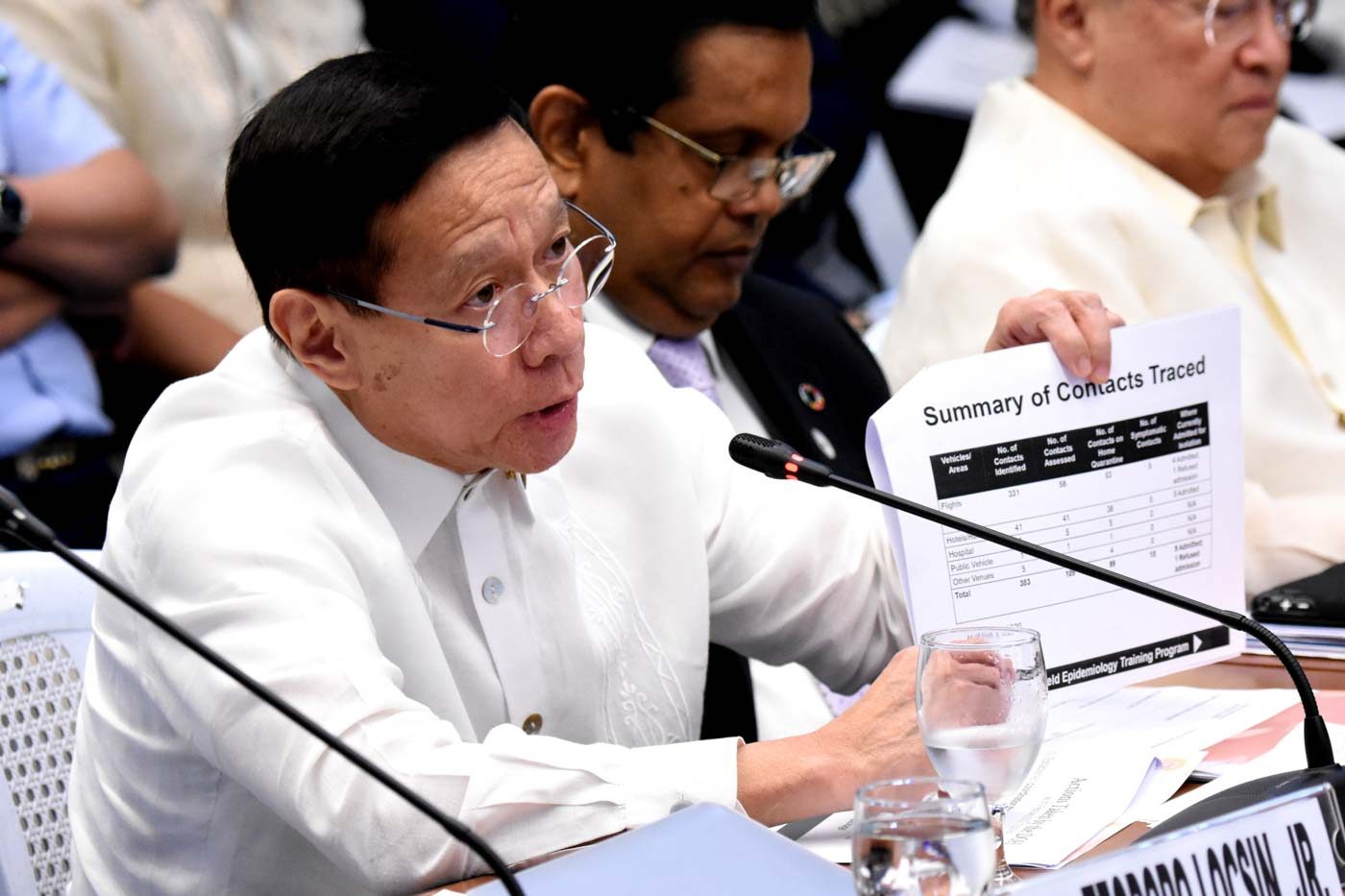SUMMARY
This is AI generated summarization, which may have errors. For context, always refer to the full article.

MANILA, Philippines – The Department of Health (DOH) has only contacted 17% or around 50 of the 331 passengers who may have come in contact with the country’s first two confirmed cases of 2019 novel coronavirus (2019-nCoV), revealing gaps in the government’s protocol for tracking down potentially infected persons.
Health Secretary Francisco Duque III made the statement in a Senate hearing on Tuesday, February 4, after Senator Nancy Binay asked for a progress report on DOH efforts to track down passengers on the same flights as the couple from Wuhan, China, one of whom became the first person to die of the virus outside China. (READ: TIMELINE: The novel coronavirus epidemic)
“I’ll be the first one to admit, it’s not easy to do this,” Duque said, referring to contact tracing, during the Senate hearing on the Philippine government’s preparedness against the 2019-nCoV attended by a number of Cabinet officials led by Executive Secretary Salvador Medialdea.
The Philippines’ 2019 nCoV cases – a 38-year-old woman and 44-year-old man – traveled from Wuhan via Hong Kong, and from there took a Cebu Pacific flight to Cebu, then later another Cebu Pacific flight to Dumaguete. Days later, they a took Philippine Airlines flight to Manila. They were both admitted to the San Lazaro Hospital in Manila upon arrival but the man died nearly a week later, on February 1.
Senators took turns grilling government officials on the issue of contact tracing, which is crucial in stemming the spread of the dread virus, which has killed over 400 people and infected over 20,000 people in 25 countries, mostly in China.
Senators noted the apparent lack of communication between the DOH and the Civil Aeronautics Board (CAB) and the Civil Aviation Authority of the Philippines (CAAP) regarding contact tracing.
“Nakakalungkot na parang hindi kayo nag-uusap (It’s disappointing to see that it seems you haven’t been speaking to each other). Secretary Duque, you could have coordinated with CAAP and CAB if you are having these difficulties,” said Binay.
Though Cebu Pacific and Philippine Airlines had both released statements about cooperating with the health department’s Bureau of Quarantine (BOQ) and providing the necessary flight manifest data, Duque said airlines had shared flight manifests but had “not been sharing contact details of passengers and invoking confidentiality.”
“They are invoking Data Privacy. This is rather strange, in this urgent situation, I do not understand why this is the case. But I think this has to be investigated,” Duque said.
But CAB Executive Director Carmelo Arcilla said airlines would readily give such information under current circumstances. “In my experience, the experience of our office, they would be willing to share it, especially during an event like this,” he said.
CAAP General Manager Eddie Monreal said, “People, as long as you tell them the flight number, I’m sure, if they were on board, they would also volunteer themselves, so I don’t see a reason why the airlines would withhold the names.”
Monreal added that only the passengers who occupied the 4 seats in front, 4 seats behind, 4 seats to the left, and 4 seats to the right of infected people – not all plane passengers – have to be contacted, as planes have hospital-grade HEPA filters, which clear the air of airborne particles and viruses.
But Duque also admitted that there might be a “lack of transparency on the part of some (DOH) people.” Visibly flustered, Duque said, “In all of our meetings, there have been no indications raised to me that this has been a problem.”
Senator Francis Pangilinan said of the apparent lapse, “When only 17% of those passengers have been contacted since this issue erupted, I don’t think it’s only a failure of communication, I think it is also a failure of leadership on the part of the health department.”
The DOH had said since the confirmation of the first 2019-nCoV case in the Philippines on January 30 that it was on top of identifying people the patient interacted with, as well as the establishments that she went to and employees she had been in contact with. So far, it has established 8 of these people as persons under investigation, meaning they showed symptoms of respiratory illness.
As of Tuesday, February 4, the DOH was probing 80 people for 2019-nCoV. This figure includes the 2 confirmed cases, 68 others who were still in hospitals, and 10 who have been discharged but are under monitoring. Of these, 48 samples are awaiting confirmation for the 2019-nCoV while 30 have tested negative. – Rappler.com
Add a comment
How does this make you feel?
There are no comments yet. Add your comment to start the conversation.